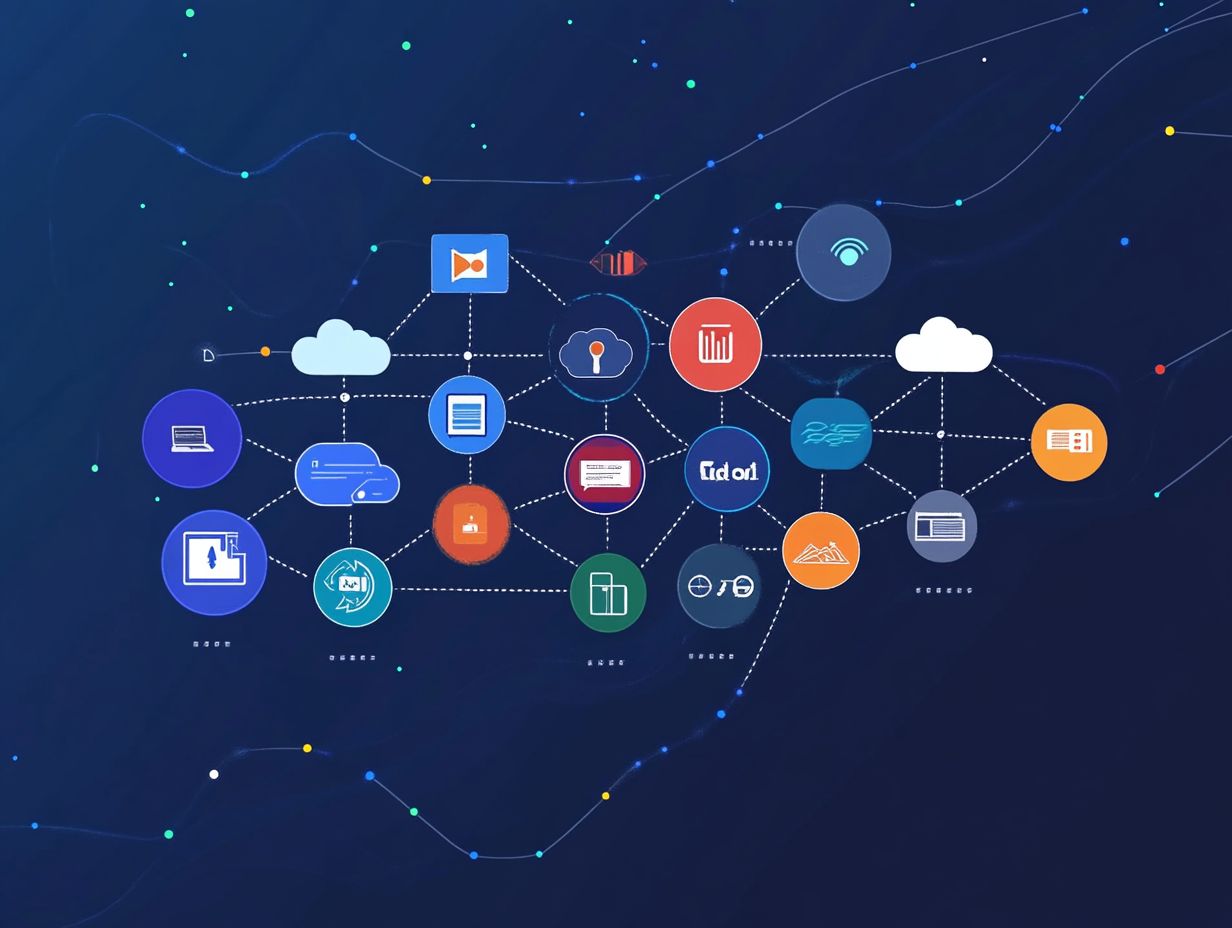A Guide to Cloud Provider Certifications
In today s digital landscape, cloud computing has emerged as a cornerstone for both businesses and professionals.
Securing cloud provider certifications is crucial for showcasing your expertise and elevating your career prospects in this fast-paced domain.
This article delves into the myriad benefits these certifications offer, both for individuals and organizations. It outlines the different types available and provides insights on how to choose the most suitable one for your needs.
This article covers preparation strategies and tips for maintaining your certification, ensuring that you remain at the forefront of the competitive tech environment.
Contents
- Key Takeaways:
- Benefits of Cloud Provider Certifications
- Types of Cloud Provider Certifications
- How to Choose the Right Certification
- Preparing for a Cloud Provider Certification Exam
- Maintaining and Renewing Certifications
- Frequently Asked Questions
- What are cloud provider certifications?
- Why is it important to have a cloud provider certification?
- How do I choose the right cloud provider certification for me?
- What are some popular cloud provider certifications?
- How do I prepare for a cloud provider certification exam?
- Do I need to renew my cloud provider certification?
Key Takeaways:

Cloud provider certifications offer numerous benefits for individuals and organizations, including improved skills and credibility in the industry.
There are various types of cloud provider certifications available, including the top cloud security certifications for professionals, each with their own specific focus and requirements.
It is important to carefully consider which certification is the best fit for your goals and needs.
Proper preparation is essential for successfully passing a cloud provider certification exam.
Utilizing study materials and strategies can greatly increase your chances of success.
What are Cloud Provider Certifications?
Cloud provider certifications are specialized credentials that validate your skills and knowledge in cloud computing technologies. They are essential for roles like cloud architect, network architect, and DevOps engineer. These roles are critical for designing, managing, and deploying cloud services.
These certifications delve into key areas such as cloud concepts, infrastructure, and security. They are offered by leading vendors like Amazon Web Services (AWS), Microsoft Azure, and Google Cloud.
They provide a structured pathway for you to elevate your career in the ever-evolving landscape of digital transformation and cloud solutions. By obtaining certifications like:
- CompTIA Cloud+
- AWS Certified Solutions Architect
- Azure Administrator Associate
- Google Professional Cloud Architect
You not only enhance your marketability but also gain valuable insights into best practices and advanced strategies in cloud management.
Each certification hones in on different aspects of cloud technologies, equipping you with the skills necessary to tackle real-world challenges effectively.
Organizations highly value these credentials, as they demonstrate your commitment to professional development, enabling you with a competitive edge in a crowded job market where cloud expertise is increasingly in demand.
Benefits of Cloud Provider Certifications
Cloud provider certifications unlock big advantages for your career! The benefits include enhanced job security, increased earning potential, and the ability to navigate the swift currents of digital transformation in today s technology landscape.
By securing these credentials, you demonstrate your expertise in cloud solutions, making yourself more appealing to employers and elevating your career prospects.
Additionally, organizations thrive with a skilled workforce proficient in cloud computing, which is essential for harnessing cutting-edge technology effectively.
Advantages for Individuals and Organizations
Cloud provider certifications present substantial benefits for you and your organization. They enhance job security for IT professionals while ensuring that your company has access to qualified talent skilled in implementing effective cloud solutions.
By obtaining a certification, you open doors to career advancement and the potential for a six-figure salary, underscoring the increasing demand for cloud computing expertise.
Credentials like CompTIA Cloud+ and AWS Certified Solutions Architect not only enhance your resume but also demonstrate to employers your dedication to professional development and adherence to industry standards.
When you invest in these certifications, you often discover expanded responsibilities and leadership opportunities. From an organizational standpoint, having certified staff can significantly boost productivity.
These experts are better equipped to leverage cloud technologies in innovative ways, resulting in more streamlined operations and enhanced agility.
The outcome is a workforce that not only meets current technological demands but also propels future growth and transformation within your company.
Ready to elevate your career? Start exploring cloud provider certifications now!
Types of Cloud Provider Certifications

You’ll find a diverse range of cloud provider certifications tailored to various roles and expertise levels within the cloud computing landscape. These certifications can supercharge your career by validating your skills!
Among the noteworthy options are:
- CompTIA Cloud+
- Google Professional Cloud DevOps Engineer
- AWS Certified Solutions Architect – Associate
- Microsoft Certified: Azure Administrator Associate
These certifications validate your skills in key areas like cloud architecture, security, and the services offered by leading providers such as Amazon Web Services, Microsoft Azure, and Google Cloud.
Key Cloud Certifications
Consider these major cloud certifications:
- CompTIA Cloud+, which lays the groundwork for essential cloud concepts.
- The Google Professional Cloud DevOps Engineer certification, designed to enhance collaboration and productivity within cloud environments.
- The AWS Certified Solutions Architect – Associate, which validates your architectural skills.
- The Microsoft Certified: Azure Administrator Associate, tailored for effective Azure management.
- The Certified Cloud Security Professional (CCSP), a standout option for cloud security best practices.
These certifications cover a broad array of topics vital for understanding the changing cloud world. CompTIA Cloud+, for instance, is an excellent introductory certification with minimal prerequisites, making it an accessible starting point for aspiring professionals.
On the other hand, the Google Professional Cloud DevOps Engineer certification encourages you to master automated workflows and agile practices, promoting efficiency in deployment processes.
The AWS Certified Solutions Architect – Associate focuses on strategic architecture design, opening doors to roles like Solutions Architect or Cloud Engineer. If you aim to manage Azure resources effectively, the Microsoft Certified: Azure Administrator Associate is essential.
For those looking to enhance their expertise in security, the CCSP is particularly valuable. It addresses the growing employer demand for data integrity and regulatory compliance especially crucial as cloud breaches have surged by over 50% in recent years.
How to Choose the Right Certification
Selecting the right cloud certification is essential for IT professionals seeking to bolster their job security and career paths in the dynamic realm of cloud computing. Consider your personal career aspirations, current skill set, and the specific technologies or platforms pertinent to your role.
By strategically aligning your certification choice with industry demand, you can effectively position yourself for optimal career growth and a wealth of opportunities.
Factors to Consider
When selecting a cloud certification, consider several key factors that can shape your career trajectory. Reflect on your career goals, the specific cloud solutions you want to specialize in, and the level of hands-on experience the certification demands.
Understanding the intricacies of various certifications will enable you to make an informed decision that aligns with your interests and the prevailing industry trends. For example, if you’re aiming for a role in cloud architecture, pursuing certifications like the AWS Certified Solutions Architect or the Google Cloud Professional Cloud Architect can be a wise choice, as these credentials hold significant esteem in the industry.
It’s essential to assess the ever-evolving market demand; with more companies migrating to cloud environments, expertise in platforms like Azure or AWS can greatly enhance your employability.
Having certifications related to DevOps practices, which is a set of practices that combines software development and IT operations, is increasingly valuable. Organizations seek individuals who can optimize their cloud deployment and management strategies.
Ultimately, aligning your skill set with industry-relevant certifications amplifies your career potential and enables you to stay ahead in a competitive landscape. Don t miss out on the chance to boost your skills!
Start your cloud certification journey today and open doors to new opportunities!
Preparing for a Cloud Provider Certification Exam

Preparing for a cloud provider certification exam demands a strategic approach that emphasizes hands-on experience, the right study materials, and a thorough grasp of cloud concepts.
You should leverage a variety of resources, such as online courses, practice exams, and study groups, to ensure you are comprehensively prepared for your chosen certification. This multifaceted preparation will equip you with the confidence and knowledge needed to succeed in your exam.
Study Materials and Strategies
Effective study materials and strategies are essential for your success in cloud certification exams. Use a mix of textbooks, online courses, and hands-on labs.
By combining these tools, you can deepen your understanding of cloud concepts and ensure thorough preparation for the exam. Incorporate highly regarded textbooks that align with your certification goals, as they often cover essential topics in detail.
Online platforms like Simplilearn provide structured courses filled with interactive content tailored to various certification paths, allowing you to grasp key concepts systematically. Engaging in hands-on labs will help you develop real-world skills and apply your knowledge effectively.
It s crucial to adopt effective exam strategies, such as practicing time management during mock tests, which can significantly reduce anxiety on the actual exam day. Don’t overlook the value of community forums; they can be a treasure trove of support and insights.
Maintaining and Renewing Certifications
Keep your IT career thriving by maintaining and renewing your cloud certifications! This ensures you stay informed about the latest advancements in cloud computing.
The requirements for continuing education can differ by certification, but they generally involve completing a certain number of credits or courses within a specified timeframe. This commitment keeps you aligned with industry standards and boosts your expertise in a rapidly evolving field.
Continuing Education Requirements
Continuing education requirements for cloud certifications are crucial for you as an IT professional to maintain your credentials and keep pace with industry advancements. These requirements typically involve completing specific courses or training, ensuring that you’re well-versed in the latest cloud solutions and security practices.
Renewal processes can differ depending on the certification body, with some requiring you to earn a certain number of credits for ongoing professional education each year. For example, if you’re an AWS Certified Solutions Architect or a Microsoft Azure professional, you’ll need to engage in ongoing learning to stay updated on fast-evolving technologies like container services, AI integration, and serverless computing.
By prioritizing this ongoing education, you enhance your technical expertise and boost your ability to secure and optimize cloud resources. This dedication to learning is essential for fostering innovation and preserving a competitive edge in a field that is in a state of constant flux.
Frequently Asked Questions

What are cloud provider certifications?
Cloud provider certifications are professional credentials that demonstrate a person’s knowledge and expertise in managing and utilizing cloud computing services.
Why is it important to have a cloud provider certification?
Holding a cloud provider certification can enhance your credibility and increase your chances of being hired by top companies in the tech industry. It also showcases your proficiency in cloud computing, a highly sought-after skill in today’s job market.
How do I choose the right cloud provider certification for me?
When selecting a cloud provider certification, consider your career goals. Focus on the specific cloud platform or service you want to specialize in.
Also, think about the level of expertise you want to achieve. Research the certifications available and choose one that matches what you want to accomplish.
What are some popular cloud provider certifications?
Popular cloud provider certifications include:
- AWS Certified Solutions Architect
- Microsoft Certified: Azure Administrator Associate
- Google Cloud Certified Professional Cloud Architect
- CompTIA Cloud+
How do I prepare for a cloud provider certification exam?
To prepare for a cloud provider certification exam, study relevant materials. Taking practice tests and gaining hands-on experience with the cloud platform is essential.
Certification providers often offer study guides and training courses to help you gear up.
Do I need to renew my cloud provider certification?
You ll want to keep your certification fresh! Most require renewal every 1-3 years.
This ensures you stay up-to-date with the latest developments in cloud computing.





